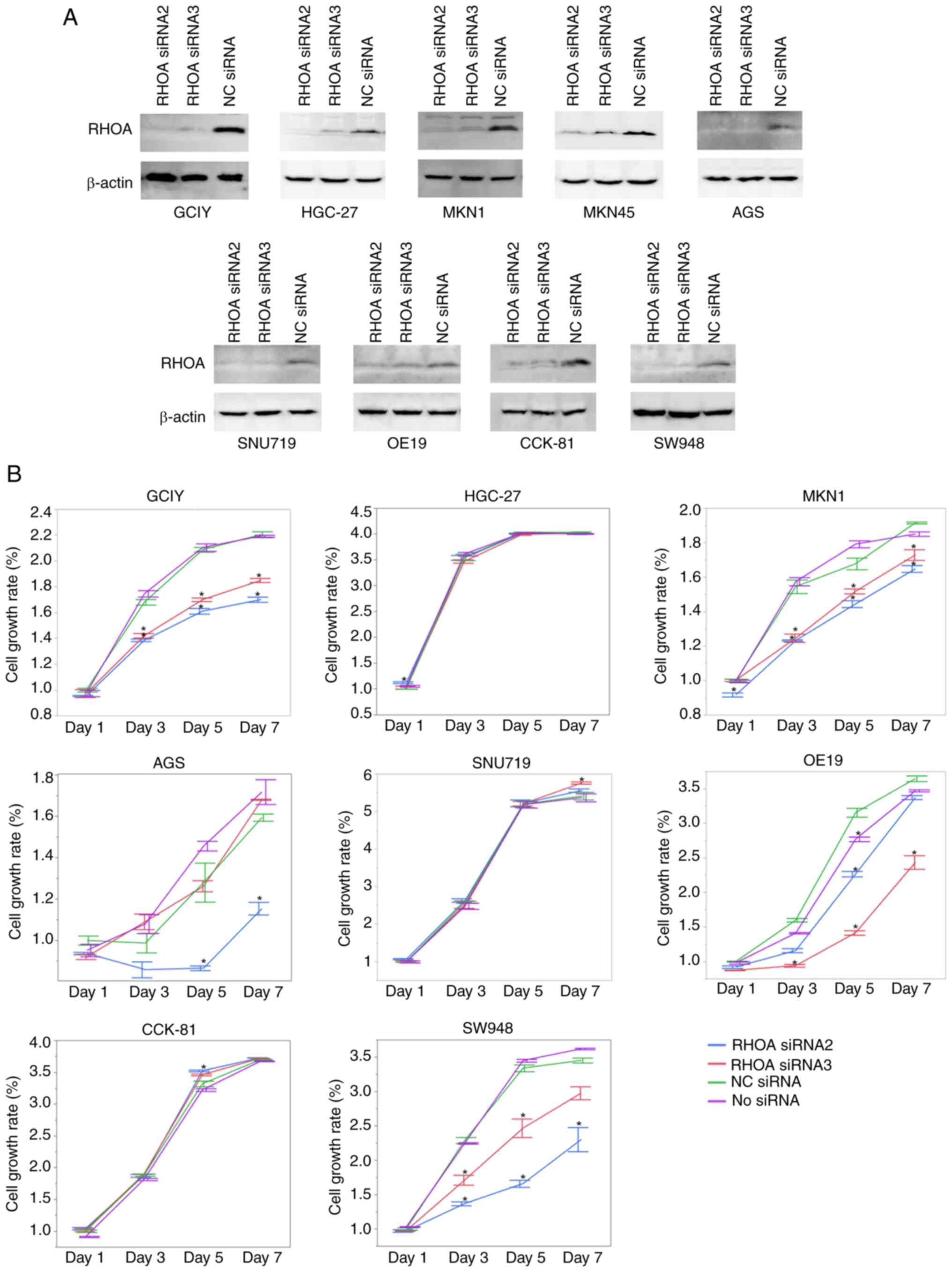|
1
|
Kakiuchi M, Nishizawa T, Ueda H, Gotoh K,
Tanaka A, Hayashi A, Yamamoto S, Tatsuno K, Katoh H, Watanabe Y, et
al: Recurrent gain-of-function mutations of RHOA in diffuse-type
gastric carcinoma. Nat Genet. 46:583–587. 2014. View Article : Google Scholar : PubMed/NCBI
|
|
2
|
Wang K, Yuen ST, Xu J, Lee SP, Yan HH, Shi
ST, Siu HC, Deng S, Chu KM, Law S, et al: Whole-genome sequencing
and comprehensive molecular profiling identify new driver mutations
in gastric cancer. Nat Genet. 46:573–582. 2014. View Article : Google Scholar : PubMed/NCBI
|
|
3
|
Ushiku T, Ishikawa S, Kakiuchi M, Tanaka
A, Katoh H, Aburatani H, Lauwers GY and Fukayama M: RHOA mutation
in diffuse-type gastric cancer: A comparative clinicopathology
analysis of 87 cases. Gastric Cancer. 19:403–411. 2016. View Article : Google Scholar : PubMed/NCBI
|
|
4
|
Zhang H, Schaefer A, Wang Y, Hodge RG,
Blake DR, Diehl JN, Papageorge AG, Stachler MD, Liao J, Zhou J, et
al: Gain-of-function RHOA mutations promote focal adhesion kinase
activation and dependency in diffuse gastric cancer. Cancer Discov.
10:288–305. 2020. View Article : Google Scholar : PubMed/NCBI
|
|
5
|
Sakata-Yanagimoto M, Enami T, Yoshida K,
Shiraishi Y, Ishii R, Miyake Y, Muto H, Tsuyama N, Sato-Otsubo A,
Okuno Y, et al: Somatic RHOA mutation in angioimmunoblastic T cell
lymphoma. Nat Genet. 46:171–175. 2014. View
Article : Google Scholar : PubMed/NCBI
|
|
6
|
Chang HR, Nam S, Lee J, Kim JH, Jung HR,
Park HS, Park S, Ahn YZ, Huh I, Balch C, et al: Systematic approach
identifies RHOA as a potential biomarker therapeutic target for
Asian gastric cancer. Oncotarget. 7:81435–81451. 2016. View Article : Google Scholar : PubMed/NCBI
|
|
7
|
Korourian A, Roudi R, Shariftabrizi A and
Madjd Z: MicroRNA-31 inhibits RhoA-mediated tumor invasion and
chemotherapy resistance in MKN-45 gastric adenocarcinoma cells. Exp
Biol Med (Maywood). 242:1842–1847. 2017. View Article : Google Scholar : PubMed/NCBI
|
|
8
|
Zhao X, Lu L, Pokhriyal N, Ma H, Duan L,
Lin S, Jafari N, Band H and Band V: Overexpression of RhoA induces
preneoplastic transformation of primary mammary epithelial cells.
Cancer Res. 69:483–491. 2009. View Article : Google Scholar : PubMed/NCBI
|
|
9
|
Ideo H, Seko A and Yamashita K: Galectin-4
binds to sulfated glycosphingolipids and carcinoembryonic antigen
in patches on the cell surface of human colon adenocarcinoma cells.
J Biol Chem. 280:4730–4737. 2005. View Article : Google Scholar : PubMed/NCBI
|
|
10
|
Ma C, Xie J, Luo C, Yin H, Li R, Wang X,
Xiong W, Zhang T, Jiang P, Qi W, et al: OxLDL promotes
lymphangiogenesis and lymphatic metastasis in gastric cancer by
upregulating VEGF-C expression and secretion. Int J Oncol.
54:572–584. 2019.PubMed/NCBI
|
|
11
|
Ohashi N, Kodera Y, Nakanishi H, Yokoyama
H, Fujiwara M, Koike M, Hibi K, Nakao A and Tatematsu M: Efficacy
of intraperitoneal chemotherapy with paclitaxel targeting
peritoneal micrometastasis as revealed by GFP-tagged human gastric
cancer cell lines in nude mice. Int J Oncol. 27:637–644.
2005.PubMed/NCBI
|
|
12
|
Kim YI, Lee HJ, Khang I, Cho BN and Lee
HK: Selective inhibition of cell growth by activin in SNU-16 cells.
World J Gastroenterol. 12:3000–3005. 2006. View Article : Google Scholar : PubMed/NCBI
|
|
13
|
Kuboki Y, Shimizu K, Hatori T, Yamamoto M,
Shibata N, Shiratori K and Furukawa T: Molecular biomarkers for
progression of intraductal papillary mucinous neoplasm of the
pancreas. Pancreas. 44:227–235. 2015. View Article : Google Scholar : PubMed/NCBI
|
|
14
|
Fennema E, Rivron N, Rouwkema J, van
Blitterswijk C and de Boer J: Spheroid culture as a tool for
creating 3D complex tissues. Trends Biotechnol. 31:108–115. 2013.
View Article : Google Scholar : PubMed/NCBI
|
|
15
|
Mi H, Huang X, Muruganujan A, Tang H,
Mills C, Kang D and Thomas PD: PANTHER version 11: Expanded
annotation data from gene ontology and reactome pathways, and data
analysis tool enhancements. Nucleic Acids Res. 45:D183–D189. 2017.
View Article : Google Scholar : PubMed/NCBI
|
|
16
|
Liu J, McCleland M, Stawiski EW, Gnad F,
Mayba O, Haverty PM, Durinck S, Chen YJ, Klijn C, Jhunjhunwala S,
et al: Integrated exome and transcriptome sequencing reveals ZAK
isoform usage in gastric cancer. Nat Commun. 5:38302014. View Article : Google Scholar : PubMed/NCBI
|
|
17
|
Mouradov D, Sloggett C, Jorissen RN, Love
CG, Li S, Burgess AW, Arango D, Strausberg RL, Buchanan D, Wormald
S, et al: Colorectal cancer cell lines are representative models of
the main molecular subtypes of primary cancer. Cancer Res.
74:3238–3247. 2014. View Article : Google Scholar : PubMed/NCBI
|
|
18
|
Liu N, Bi F, Pan Y, Sun L, Xue Y, Shi Y,
Yao X, Zheng Y and Fan D: Reversal of the malignant phenotype of
gastric cancer cells by inhibition of RhoA expression and activity.
Clin Cancer Res. 10:6239–6247. 2004. View Article : Google Scholar : PubMed/NCBI
|
|
19
|
Kuo PL, Huang YL, Hsieh CC, Lee JC, Lin BW
and Hung LY: STK31 is a cell-cycle regulated protein that
contributes to the tumorigenicity of epithelial cancer cells. PLoS
One. 9:e933032014. View Article : Google Scholar : PubMed/NCBI
|
|
20
|
Hsu WC, Le HN, Lin YJ, Chen MC, Wang TF,
Li CC, Kuo WW, Mahalakshmi B, Singh CH, Chen MC and Huang CY:
Calmodulin/CaMKII-γ mediates prosurvival capability in
apicidin-persistent hepatocellular carcinoma cells via
ERK1/2/CREB/c-fos signaling pathway. J Cell Biochem. 122:612–625.
2021. View Article : Google Scholar : PubMed/NCBI
|
|
21
|
Xie Q, Lin T, Zhang Y, Zheng J and Bonanno
JA: Molecular cloning and characterization of a human AIF-like gene
with ability to induce apoptosis. J Biol Chem. 280:19673–19681.
2005. View Article : Google Scholar : PubMed/NCBI
|
|
22
|
Kofler M, Speight P, Little D, Di
Ciano-Oliveira C, Szászi K and Kapus A: Mediated nuclear import and
export of TAZ and the underlying molecular requirements. Nat
Commun. 9:49662018. View Article : Google Scholar : PubMed/NCBI
|

















